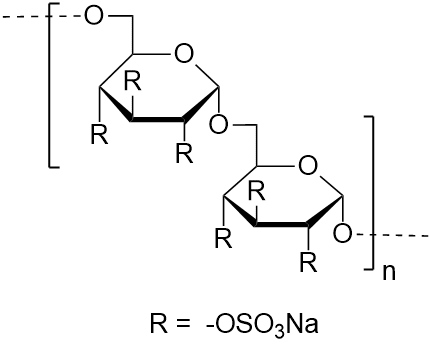Dextran sulfate sodium salt, Mw ~ 80000 is widely utilized in research focused on:
- Anticoagulant Applications: This compound is used in various medical settings to prevent blood clotting, making it valuable in surgeries and treatments that require blood flow management.
- Drug Delivery Systems: Its ability to form stable complexes with drugs enhances the delivery and bioavailability of therapeutic agents, particularly in cancer treatment.
- Cell Culture Media: In biotechnology, it serves as a supplement in cell culture media, promoting cell growth and viability, which is essential for vaccine production and other biopharmaceuticals.
- Research in Immunology: It is utilized in studies to understand immune responses, particularly in the modulation of immune cell activity, aiding in the development of immunotherapies.
- Wound Healing Products: The compound is incorporated into topical formulations for its anti-inflammatory properties, helping to accelerate wound healing and tissue regeneration.
General Information
Properties
Safety and Regulations
Applications
Dextran sulfate sodium salt, Mw ~ 80000 is widely utilized in research focused on:
- Anticoagulant Applications: This compound is used in various medical settings to prevent blood clotting, making it valuable in surgeries and treatments that require blood flow management.
- Drug Delivery Systems: Its ability to form stable complexes with drugs enhances the delivery and bioavailability of therapeutic agents, particularly in cancer treatment.
- Cell Culture Media: In biotechnology, it serves as a supplement in cell culture media, promoting cell growth and viability, which is essential for vaccine production and other biopharmaceuticals.
- Research in Immunology: It is utilized in studies to understand immune responses, particularly in the modulation of immune cell activity, aiding in the development of immunotherapies.
- Wound Healing Products: The compound is incorporated into topical formulations for its anti-inflammatory properties, helping to accelerate wound healing and tissue regeneration.
Documents
Safety Data Sheets (SDS)
The SDS provides comprehensive safety information on handling, storage, and disposal of the product.
Product Specification (PS)
The PS provides a comprehensive breakdown of the product’s properties, including chemical composition, physical state, purity, and storage requirements. It also details acceptable quality ranges and the product's intended applications.
Certificates of Analysis (COA)
Search for Certificates of Analysis (COA) by entering the products Lot Number. Lot and Batch Numbers can be found on a product’s label following the words ‘Lot’ or ‘Batch’.
Número de catálogo
Número de lote/lote
Certificates Of Origin (COO)
This COO confirms the country where the product was manufactured, and also details the materials and components used in it and whether it is derived from natural, synthetic, or other specific sources. This certificate may be required for customs, trade, and regulatory compliance.
Número de catálogo
Número de lote/lote
Safety Data Sheets (SDS)
The SDS provides comprehensive safety information on handling, storage, and disposal of the product.
DownloadProduct Specification (PS)
The PS provides a comprehensive breakdown of the product’s properties, including chemical composition, physical state, purity, and storage requirements. It also details acceptable quality ranges and the product's intended applications.
DownloadCertificates of Analysis (COA)
Search for Certificates of Analysis (COA) by entering the products Lot Number. Lot and Batch Numbers can be found on a product’s label following the words ‘Lot’ or ‘Batch’.
Número de catálogo
Número de lote/lote
Certificates Of Origin (COO)
This COO confirms the country where the product was manufactured, and also details the materials and components used in it and whether it is derived from natural, synthetic, or other specific sources. This certificate may be required for customs, trade, and regulatory compliance.


